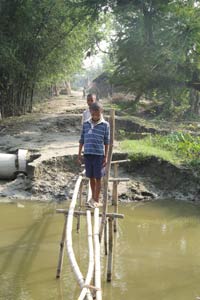They are still in waters
Chatapur, 1st November 2008
The footprints that man leaves in his wake. The work that man does. His creation, his world – I was thinking of these as I walked from our camp to the next district. We give it so much importance and it is our very existence – but in a moment nature can wipe it all away. Just a few footprints tell of our passing – but they too are washed away, inundated.

The next district is about 15 kms away. I started out with a local person at about 7.30 in the morning.
We waded through water and slush, squelched through mud which didn’t want to let go of our slippers – so we started walking barefoot – crossed bridges which were made of a couple of bamboo poles, over which we had to balance or fall down,

crossed a rivulet by boat and finally saw the breadth of the Koshi river.


That which was about a hundred feet wide at one time is about 1.5 to 2 kilometers wide now. All the area around the river is also water-logged. Unless the flow of water is controlled the farmers wont be able to grow anything. And even if the flow of water is controlled today, it will take a couple of months for the water-logged ground to become fit for cultivation.
In some areas people still cannot return to their homes as the water still flows high. Others have to somehow make a house to which they can return for their houses have been swallowed up by the waters. But still people make their way back to their villages. All they own is what they are carrying.
With small children on shoulders or on cycles, with sacks of provisions, with fodder for their cattle – they trudge to what they call home.

In other places the problem is different – the waters have receded and the land is relatively dry – but the rivers have left a couple of feet of sand on the land.

Again nothing is possible till the farmers are able to remove all the sand and make the land arable. They only hope to sow rice again in March. Even that would not be possible for some.
We talked to the people of the different villages about their present problems, problems that they foresee in the near future, what they thought were the solutions to their problems, about the ashram and Amma. We personally went and saw assessed the damage the waters had inflicted. The people were happy to have us there. Again as before we were told that we were the first people from outside who had come there to actually see and assess the situation. They said that they did not want anything more; they had been blessed by the very presence of people from Amma’s ashram. They were also very happy with the services we had been providing, though all of them might not have been directly benefited.
But this is not the case every where. In a society which exploits, the simple villagers too had been taught to grab what they could – Bihar is infamous for such happenings – there were many who just wanted to know what we were going to give to them. Many a times they refused to believe that we had just come to look for now – they wanted us to write down their names or come and see their houses. or take their photo – so that they would get some compensation.
We reached back in our camp at about 6 pm in the evening – having walked almost continuously for about 7 to 8 hours.
— Nijamrita
Join the conversation! 2 Comments
Leave a Reply
You must be logged in to post a comment.

Thank you for all of your hard work and dedication Nijamrita. On top of all of the work you still find time to write to us. I am very grateful for that. Ammas grace is evidient in that my son and I are free from harm. Jai Amma!
Thank you, dear Swami, for sharing your thoughts and feelings with us.
Today I was sitting in the train, thinking how I waste my precious lifetime by working, sleeping, eating etc. I wish I could also reach out directly to help the poor and the needy, just like you. But all I can do here is to make some money and donate as much as possible to Ammas charities. I hope that this will at least make a little difference.